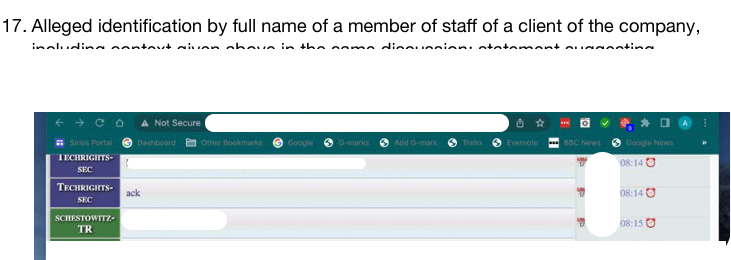Monday, January 9th, 2023, 2:33 am
Commencing a Witch-hunt Based on False Pretences
False pretences by a lying boss
Summary: The Sirius ‘Open Source’ CEO seems to be lying about clients, not just lying to clients; it’s used as an excuse for a witch-hunt against Sirius staff
TWO days ago we showed that the CEO asked to speak “urgently” with Rianne. A day before that we showed he had said the same to me, her husband. Same words, as shown here before (we shared a complete trail of correspondence).
He said there was a “matter that has been brought to my attention” and to paraphrase what he said to Rianne while he recorded her, a client complained about being mentioned by me. But who is this client that caused the CEO to see or envision an “urgent” need to “discuss a matter that has been brought to my attention?”
Who is it?
It’s a client, he claimed, but he did not name anyone. Two weeks later he showed a supposed piece of evidence, but that did not match what we could verify. Hence, we believe he was lying on the call. He was trying to make up excuses for his proactive stalking. To Rianne he said something to the effect of, I want you to come to the meeting because someone brought this to my attention… and on the phone he insisted that the investigation was initiated because of an outsider. He was quite likely lying about that, basically manufacturing a set of false pretenses.
We’re dealing with a big problem here. We’ve been dealing with this kind of problem for a whole year. We have a pathological liar running the business based on a foundation of lies he cannot remember or keep up with.
After I saw who’s said to have been mentioned in IRC (only once and with a typo; it’s a famous person anyway — one who is known to millions of people and whose name is mentioned on the Internet every day) I decided to get in touch and fact-check the accuser.
As readers are aware, the accuser was in deep denial over the LastPass breach (more on that later this month; we wrote a lot about it last month). He kept rejecting the idea LastPass was not secure. Even a year ago one colleague said to all peers in a “Handover to Shift 1 (16/07/21)” that “I’ve found that emailing stuff from Lastpass doesn’t actually work, so if he doesn’t receive the email then this might be the issue. Is sending via Lastpass any more secure than sending via our email?”
I wasn’t the only person antagonising LastPass. The technical staff didn’t like LastPass and didn’t trust it. But management did not care. LastPass is assumed to be right even when it’s lying. Same as Sirius management.
Anyway, after the LastPass breach was confirmed by LastPass itself (just before Christmas; this timing was chosen by LastPass and was intentional… to lessen the damage) I informed the person whom the accuser insinuated had complained.
Here’s my message to him:
Report of LastPass Breach, Your xxxxxxxxx Passwords Compromised
Hi xxxxxxxxxxxxxx,
Sorry for the bad timing, but LastPass intentionally reported this when people were away on holiday.
People have a moral responsibility to do what’s ethical and a duty or implicit obligation to properly inform clients so as to avert major disasters (like systems and Web sites getting hijacked/defaced over the holidays).
https://www.theverge.com/2022/12/22/23523322/lastpass-data-breach-cloud-encrypted-password-vault-hackers
https://www.forbes.com/sites/daveywinder/2022/12/23/lastpass-password-vaults-stolen-by-hackers-change-your-master-password-now/
https://arstechnica.com/information-technology/2022/12/lastpass-says-hackers-have-obtained-vault-data-and-a-wealth-of-customer-info/
I’m writing to you as a Sirius veteran. I worked in the company for nearly 12 years. I know that your passwords (maybe private keys also) are in LastPass and LastPass got compromised. Now even LastPass itself admits it. In simple terms, this means hostile actors may now possess complete copies of access credentials and can in turn access your systems directly or indirectly, along with data etc. This poses a ransomware threat and can result in penalties for improper data protection.
I’ve personally warned about this for years (specifically LastPass). I brought up security breaches in LastPass, but I got threatened for my concerns. The company lacks basic understanding of security. To make matters worse, my warnings were used to push me out and Sirius did the same to my wife, who didn’t even say anything. It’s collective punishment for doing the moral thing.
You need to study what the LastPass breach means to you because Sirius put your sensitive data (keys/passwords) in LastPass.
Knowing the style of management at Sirius, I’m sure they’ll use some defamatory smears and ad hominem attacks/lies against me, but the simple fact is, you must change passwords and keys NOW.
I resigned from Sirius earlier this month; they still use LastPass and failed to respond each time I brought up the issue, including less than a month ago. There are many other issues inside the company, but they go well beyond the LastPass threat: http://techrights.org/wiki/Sirius_Open_Source
Sincerely,
Dr. Roy S. Schestowitz
Within a few hours he responded to my E-mail as follows:
Thanks very much Roy for the information. We had a very good working relationship with you and take the threat seriously. We wish you success in your future endeavours and we’ll be in touch. I wish you happy holidays and a very good new year!
Sent from xxxxxxxx
Regards, xxxxxxxx
So it was already obvious from his tone or the words that he did not complain about being mentioned.
So I went on and explained to him what had happened:
If you don’t mind me adding something, please see the attached.
This is from the letter xxxxxxxx sent to my wife months after in some very, very informal IRC channel (lots of typos, too) I had mentioned your good journalism though only after someone in the channel linked to one of your articles, not knowing that I was supporting xxxxxxxx. He has been my friend for over 15 years, but I never told him about clients. I kept that confidential.
xxxxxxxx insisted that I had mentioned a name of a client (you are very famous regardless if client or not) only when someone else (not me) linked to your work. He might want xxxxxxxx to think it’s done routinely, but you were the only such person I mentioned (and only once). There were only a handful of people in that IRC channel, all technical people.
He intimidated my wife, who had nothing to do with this, and insinuated that you contacted the company to complain because your name was mentioned. He gave only one such example, so we were simply left to assume you complained. In reality, we believe xxxxxxxx went on a fishing expedition, spending several weeks trying to frame me and when he saw your name (with a typo even!) he thought he found something to leverage in order to get rid of me (despite doing nothing wrong; they just cannot afford to pay workers!).
This is from the letters sent to my wife (yes, like an authoritarian regime) to engage in punishment through a loved one, rendering her unemployed and unable to support her parents in xxxxxxxx. He accused her of breaching rules because her spouse mentioned your name in some very tiny IRC channel a long time ago. This isn’t how investigation gets done; it is a witch-hunt.
I’m telling you this because they likely kept you in the dark about what they had been doing. Attached are the portions of the letter regarding the accusations against Rianne and the so-called ‘evidence’, which is a two-person IRC chat (myself talking to an old-time friend whom I do activism with, including thousands of press links about xxxxxxxx).
Kind regards,
Roy
The attachment is a screenshot that shows his name. It is carefully redacted below to avoid identification (by words, name, date, and URL):
To summarise, it seems rather apparent that Sirius clients did not complain about me. This was likely about an insecure CEO (without experience) trying to silence a dissenting voice of reason, who simply refused to lie to clients.






 Filed under:
Filed under: 


